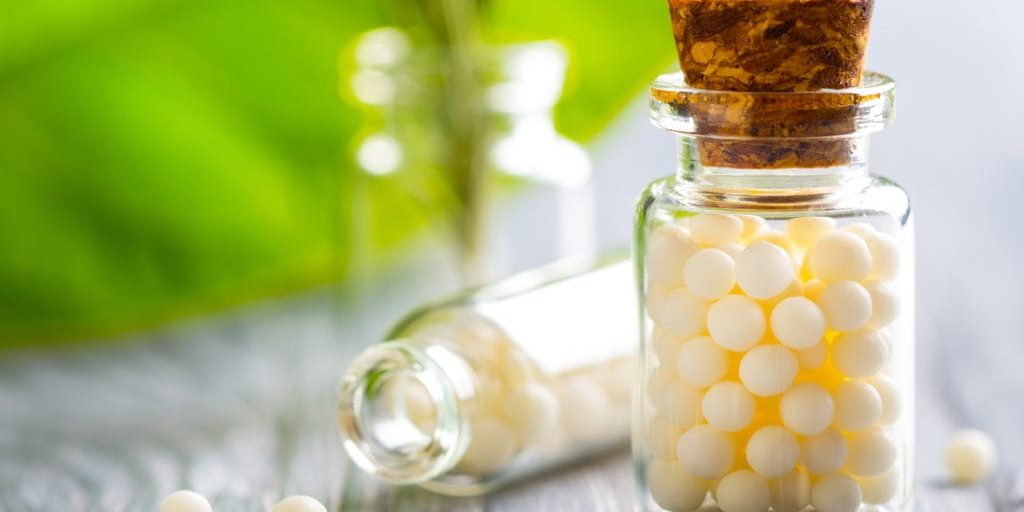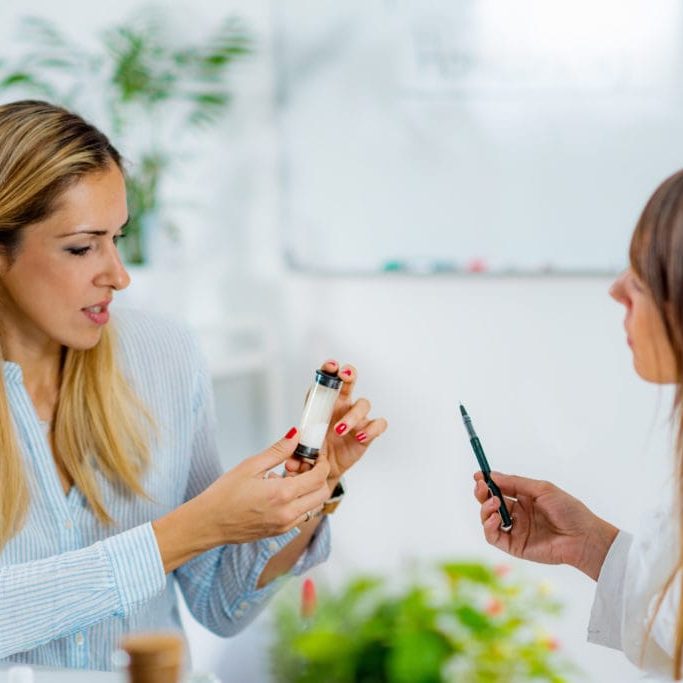What is Homeopathy?
Homeopathy is based on the principle of treating ‘like with like.’
It centres around the ability of the human body to stimulate itself into healing after being treated with a highly diluted and shaken substance – usually in tablet form – which, if given in normal concentrates, would produce illness eg treating insomnia caused by caffeine with tiny diluted amounts of the same drug ie caffeine. This works in a similar way to pollen being used to de-sensitise patients with hay fever related allergies. The substance is usually diluted in water and alcohol. It is then added to lactose tablets or pillules. Even poisonous substances can be used in homeopathy, for instance the deadly belladonna remedies are often given to children to treat high fevers without any side-effects or illness.

Over-the-counter remedies bought in pharmacies and supermarkets tend to be diluted six times (each time as one part medicine to 99 parts alcohol/water). The more dilutions and successions (shakings) the medicine has gone through, the more potent it is believed to be.
As well as symptoms, homeopaths will also look at the patient’s lifestyle and psychological/physical stature. Modern homeopaths believe that water has a memory which means homeopathic preparations can work without any of the actual substance (or active ingredient).
Homeopathic practitioners are against vaccinations, antibiotics and anti-malarial drugs.
Regulation of the practice varies between countries with some nations, such as India, incorporating it very much into their healthcare system and other areas of the world practically disregarding it (especially when it comes to regulation of the therapy compared to conventional drug testing).
Homeopathy is regarded as a complementary treatment (to conventional medicine) rather than an alternative.
There exists a version of the practice called Complex Homeopathy (in contrast to the more traditional Classical Homeopathy). The former involves mixing a combination of preparations to achieve the one remedy which it is claimed will target better the disease. The premise is that the body will choose itself which particular remedy it believes will work. In this way the treatment involved in Complex Homeopathy is focusing on the disease whereas in Classical Homeopathy it is the individual and how they feel that is the main concern of the practitioner.
What to expect from a Homeopathy Session
The homeopath will take a case study, asking you about your symptoms, diet, personality, working life etc in order to build up a picture of you as an individual and the type of lifestyle you lead.
The homeopath will be more interested in your experience of your symptoms rather than the actual symptoms themselves. They’ll also want to know if the symptoms are constant or change depending on time of year, time of day etc and if anything makes them feel better or worse ie certain foods, temperature, stress etc.
Your genetic history and any serious conditions in your immediate family will also be asked for as well as your own medical history.

You’ll be asked what your general energy levels are like and whether you recover quickly after exercise or other strenuous events. Emotional levels will come into the consultation too and you’ll be asked what makes you angry, frightened, scared etc.
The goal of treatment from your own perspective will also be discussed in terms of what you hope to gain from the homeopathic sessions.
The initial appointment could last anything from one to two hours. You’ll more than likely be asked in a month’s time for a follow-up consultation when the session will be much shorter and the homeopathic will ask for an update on your physical, emotional state etc before proceeding with treatment which would probably involve adjusting the remedy.
Effects and Benefits of Homeopathy
Because it uses non-synthetic ingredients which are powerfully diluted in water and alcohol, the treatment is believed to be both safe and natural for humans and animals and does not appear to have any known side effects. Other benefits from a homeopathic treatment include:
- It is easy to take, especially for children – most of whom will happily take a sweet sugar pill
- The remedies aren’t particularly expensive compared to prescriptions used in conventional medicine
- No tests are involved in a diagnosis so there’s no lengthy waits for appointments or results
- Homeopathic remedies can be taken alongside tradition medicine without any ill effects
- It can lead to overall improvement rather than just ‘curing’ the symptoms
- Homeopathy can be useful for both chronic or acute conditions
- Everyone can receive homeopathy, from children to pensioners and pregnant or nursing women
- Unlike in modern medicine, there are no chemical side effects from homeopathic remedies
- The actual remedies can last for a long time without any concerns over sell-by dates
- The practice is non-invasive
- Homeopathic remedies are tested on humans and not animals
- Treatment for ailments such as hay fever do not result in side effects such as drowsiness unlike in traditional medicine
- It is impossible to build up a resistant to the remedies (unlike antibiotics)
Professional Bodies & Organisations
The Society of Homeopaths
This is the largest organisation of registered homeopaths in the UK. Founded in 1978, the Society aims to develop homeopathy as a profession and does so by developing and maintaining high standards in the practice. It also provides a register of homeopaths whose members agree to a code of ethics and practice. It runs a training scheme and supports the education of homeopathy both at home and abroad.
The Faculty of Homeopathy
The faculty is responsible for promoting both academic and scientific developments in the subject and was formed by an Act of Parliament in 1950. It registers multi-disciplinary homeopathic professionals and seeks to maintain high standards in education, training and practice. All members possess a medical background and qualifications eg nurses, doctors, pharmacists, vets, dentists etc. It regards itself as setting the standard for homeopathic education in the UK and abroad.
The British Homeopathic Association
Founded in 1902, the Association promotes homeopathy practiced by doctors and health care professionals in general. Their aim is to have homeopathy integrated into the NHS and available for all patients through choice. Provides information on the latest news, research and training into homeopath
The European Central Council of Homeopaths (ECCH)
The ECCH is an international non-profit making council whose members include 24 professional associations of homeopaths in 20 European countries. Set up in 1990, it encourages professional practice of Classical Homeopathy. It sets educational and training standards and maintains a code of ethics and practice which members must abide by. It also produces a public register of trained professional homeopaths. It produces a number of policy documents on homeopathy and advises government institutions on both a national and international level.
Fascinating Facts
- The father of Homeopathy is believed to be German doctor Samuel Hahnemann who introduced single doses at lower doses as well as prescribing better diets, more exercise and cleanliness
- Hahnemann also came up with the term ‘allopathic medicine’ to describe traditional western medicine (and not in a flattering way)
- Cinchona bark used to treat malaria was one of Hahnemann’s first discoveries. He noted that the effects individuals experienced from ingesting cinchona bark were similar to the effects of malaria itself
- The term Homeopathy is taken from the Greek words for cure and suffering
- When Homeopathy was first introduced the medicinal ‘cures’ at the time included purging, blood-letting and arsenic
- Hippocrates was the first to insist that ‘like cures like’ way back in 400 BC when he used mandrake rook to treat mania
- Celebrities who embrace homeopathy include Jennifer Aniston, Twiggy, Sir Paul McCartney, David Beckham, Tina Turner and Jude Law. Her Majesty the Queen and Prince Charles are also believed to be advocates of the treatment
- Today India boasts around 100 homeopathic medical schools and approximately 250,000 homeopathic doctors.
- Homeopaths in the UK are consulted by an estimated 5.75 million people a year
- Over-the-counter Homeopathic remedies such as arnica cream saw a 24 per cent growth in sales between 2002 to 2007 according to a Mintel poll in 2007
- In 2000 the House of Lords Select Committee on Complementary and Alternative Medicine officially registered homeopathy alongside therapies such as osteopathy, acupuncture and herbal medicine in that it was recognised as having its own diagnostic approach and treatment methods
- A study in 2007 of 1,602 patients in five UK NHS homeopathic hospitals discovered that eczema was the most common reason for homeopathic treatment, followed by chronic fatigue, osteoarthritis and difficulties with menopausal symptoms
- Former journalists, pharmacists, teachers, lawyers and accountants are all registered on the books on The Society of Homeopaths as practitioners today
- More than half (64 per cent) of registered homeopaths are aged 35 to 54. Around 81 per cent are women and 69 per cent practice on a part-time basis. Many have other careers and more than half (56 per cent) carry out consultations at home
- The form of vigorous shaking of substances in homeopathy is known as succession










